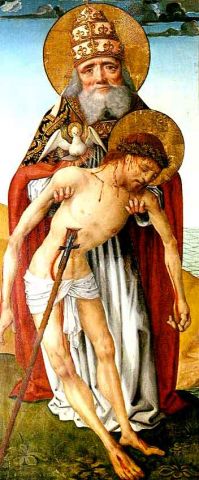 It’s easy to lapse into thinking about the doctrine of the Trinity as just some information about God. There’s some kind of downward pull on our thought-lives that makes Christianity seem like a set of 35 key ideas that you have to believe and remember. It’s easy to think that “God is one being, in three persons” is some data that God decided to lean over the ramparts of heaven and shout down at us, so we could put it in a notebook and know that it’s a fact. Don’t get me wrong, God’s triunity is a fact, and I have diligently jotted it down in my notebook. I even triple underlined it. I’ll believe anything God tells me about himself.
It’s easy to lapse into thinking about the doctrine of the Trinity as just some information about God. There’s some kind of downward pull on our thought-lives that makes Christianity seem like a set of 35 key ideas that you have to believe and remember. It’s easy to think that “God is one being, in three persons” is some data that God decided to lean over the ramparts of heaven and shout down at us, so we could put it in a notebook and know that it’s a fact. Don’t get me wrong, God’s triunity is a fact, and I have diligently jotted it down in my notebook. I even triple underlined it. I’ll believe anything God tells me about himself.
But when the doctrine of the Trinity becomes that sort of inert fact about God, even though we respectfully submit to its truth, we can’t help wondering why God had to put these hard parts in. I get this question all the time when I teach the doctrine of the Trinity: “If this is beyond our comprehension, why didn’t God just keep it a secret?” It’s reasonable to suppose there must be a thousand other things about God which our tiny minds can’t handle, and that God has been considerate enough to leave them unrevealed. Yet somehow the mind-blowing doctrine of the Trinity got out.
The reason is that doctrine of the Trinity is need-to-know information, because it is directly relevant to the salvation which the Father brought into the world when he sent his Son and poured out his Spirit. When the gospel came, it necessarily brought with it the revelation of the Son of God:
God so loved the world he gave his Son (John 3:16)
In the fullness of time, he sent forth his Son (Gal. 4:4)
God spoke in many ways…. but in these last days he has spoken through a Son (Hebrews 1:1)
Likewise for the Spirit. The Father sending the Son and the Spirit: that’s the gospel. What it presupposes is that the Father had the Son and the Spirit eternally so he could send them temporally, and that the relationship of the Father to the Son and the Spirit is so intimate that dispatching these two agents is not just delegating the task to a third party, but somehow makes the Father himself present to us. In just a hop and a skip, we find ourselves having gone from “God sent Jesus” to a whole thicket of trinitarian theologizing involving preexistence, perichoresis, consubstantiality, and eternal processions. It really is that short of a step from the glad good news of salvation to the difficult doctrines of the creeds.
There is an ancient Latin hymn about the cross of Christ which concludes with the exclamation: “Fons salutis Trinitas!” That is, “Trinity, Fountain of Salvation!” The hymn, “Vexilla regis prodeunt,” is by Venantius Fortunatus (530-609). There are many English translations, including a nice singable one by J. M. Neale, but it obscures my favorite line, “fons salutis Trinitas.” Here is the Latin with a more literal translation alongside it:
Blest Trinity, salvation’s spring, may every soul thy praises sing.
Salvation happens when God is himself for us. The one God opens up the divine life and makes available, through mercy, the fellowship of love which is the dynamic of God’s own life. The Father sends the Son and the Spirit to make fallen humans into created, adopted sons and Spirit-bearers. The Trinity is not a hard doctrine God tossed into his revelation just to make things harder. The Trinity is the fountain of salvation.